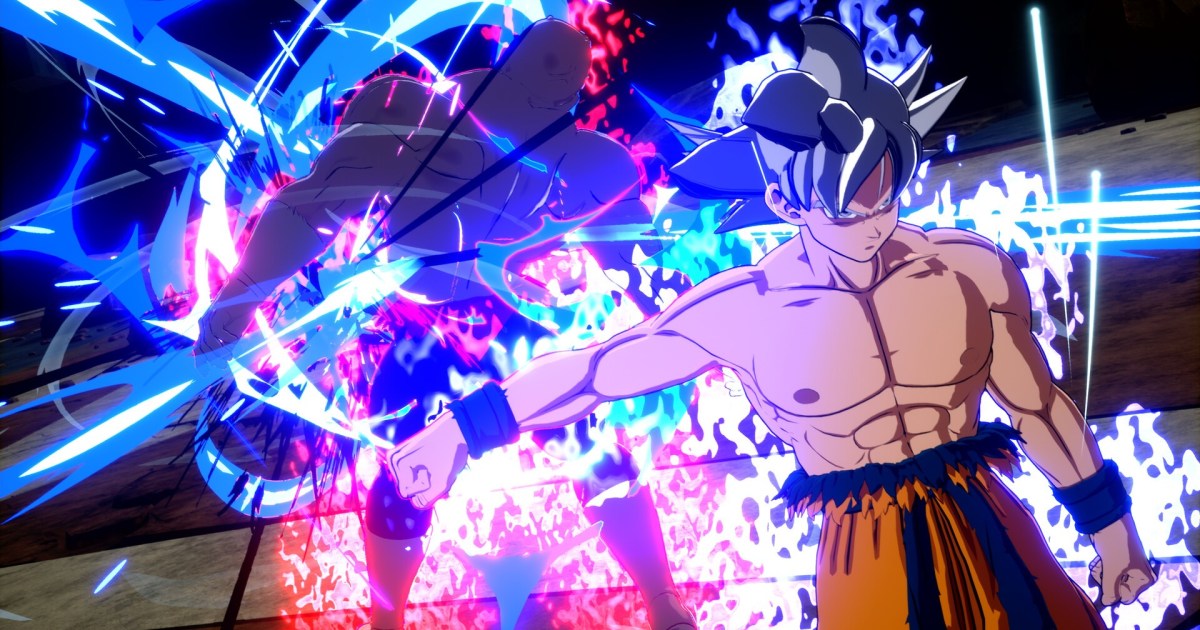Dragon Ball: Sparking! Zero
MSRP $69.99
“Dragon Ball: Sparking! Zero delivers thrilling fights, but its disjointed story mode doesn’t hold up its end of the bargain.”
Pros
- Amazing voice performances
- Fights feel true to the anime
- Custom Battles are a highlight
Cons
- Poor onboarding
- Disappointing Episode Battles
- Tedious upgrade system
I wore the paint off of my Dragon Ball action figures as a kid by recreating all my favorite fights from the anime. I only had two, meaning I had to recruit my other non-DBZ toys to fill in for other characters as best I could (my Silver Surfer made a great Frieza, while Ganondorf took more imagination to play Cell). Getting my hands on my first Dragon Ball games felt like getting a ton of new figures to add to my toy collection.
Dragon Ball: Sparking! Zero, Bandai Namco’s giant 3D Dragon Ball fighter, is the equivalent of going to a friend’s house who owns every Dragon Ball figure you can think of — and many you wouldn’t. It gives me complete freedom to play with all my favorite characters in any combination I want with all their authentic moves, voices, and designs, but leaves me to make that fun for myself. That makes for an enjoyable fighting game, but not one that’s without flaws. Existing fans might be able to overlook its disjointed story mode and its uninspired branching paths, but I can’t say that it’s the best way to introduce yourself to the wide world of Dragon Ball.
Back to the hyperbolic time chamber
Booting up Dragon Ball: Sparking! Zero, I quickly got a brief tutorial framed around Goku and Vegeta sparring. This teaches the basics of attacking, charging Ki, using special moves, and so on. If you jumped from this introduction into any other gameplay mode, as I did right away, then you would be woefully underprepared for anything beyond the first few initial battles.
While not on the level of a strict fighting game like Dragon Ball: FighterZ, Sparking! Zero has far more depth than mashing attack, block, and super moves. Only by going into the training mode and spending a half hour or so going through every move one by one will you pick up the essential techniques like vanish attacks, counters, transformations, and even how to change characters when you have more than one person on your team.

There’s also the oddly essential shop and customization menu that drags the experience down. Previous Budokai games featured a somewhat similar system where you would unlock capsules that you could equip on your characters to change their moves. In Dragon Ball: Sparking! Zero you will spend Zenni (DBZ’s currency) on capsules in a shop that don’t replace your moves, but buff your character. You can assign a certain amount to your character, and more options unlock as you do more Episode Battles.
Without a way to filter or sort the capsules either in the shop or inventory, the entire process feels like a chore. So many are situational or buff very specific moves, so I found that I ended up equipping the most broadly effective ones I could find on just the character I was using at the time and only went back if I hit a difficulty wall. Anyone who really wants to focus a character’s build in a specific way might find some enjoyment here, but the frustrating system never clicked for me.
Once you do internalize all the moves at your disposal and sort your capsules, combat in Dragon Ball: Sparking! Zero sings. When you get into a flow of dashing at your opponent and launching an attack, then seeing them teleport out of your combo to attack you from behind, only for you to counter and send them crashing into the ground, it all looks and feels like what you imagined when bashing your action figures together. You have one attack button you can make easy combos out of, but you will need to mix in your Ki, parry, and rush buttons to keep up once your opponent learns to break out of basic attack strings.
Sparking! Zero rarely falters in accurately representing the style of the anime.
You may hit some moments of frustration as you’re forced to watch your character get juggled with no way to respond, as well as occasions where both you and your opponent pause to charge up your Ki, but you are always rewarded for staying on the offensive and mastering all your tools. Seeing my opponents adapt and counter my basic techniques pushed me to go to the training menu to deepen my understanding of the systems and come back stronger, mirroring Goku’s mentality. It isn’t on the level of complexity of a traditional fighting game, but it rewards you with that same sense of satisfaction and spectacle all the same when you finish a combo string that ends with your character washing your opponent away with a massive Ki blast. Dragon Ball has never managed to make a fully seamless transition into 3D, but Sparking! Zero rarely falters in accurately representing the style of the anime.
What ties the entire experience together is the care and detail put into all the iconic moves. While every character uses the same basic controls, I was astonished to see how faithful each one was with their signature attacks. Even Goku’s moves completely change with every form. His base would call in a Spirit Bomb, while SSJ Blue would use the Limit Breaker Kamehameha, which inspired me to play with every character to see what flashy finisher they had up their sleeve. The dynamic camera angles, colors, sounds, and even reactions of the opponents are bursting with authenticity. The fact that every single one of the over 180 characters that I’ve seen thus far has received the same level of love and care as the core cast shows the team’s love for the source material.
Dragon Ball SparknoteZ
At this point, Dragon Ball fans have relived the Z saga dozens of times. There’s very little juice left to squeeze from that fruit, and the addition of Super content here isn’t quite enough to make it all feel fresh. Dragon Ball: Sparking! Zero attempts to shake up the formula in two major ways: by framing the story through Episode Battles and adding in branching paths.
Episode Battles are the stand-in for a campaign, but they’re broken up by character. Goku’s story is by far the longest and it unlocks other characters’ Episode Battles as you move through the sagas. Unlike past games, you will not be swapping perspectives in order of events to get the full picture. Instead, you strictly focus on whichever character’s campaign you have chosen. This leads to a disjointed narrative in which you jump from Goku fighting Fat Buu straight to Super Buu Gohan Absorbed, with a few scant lines of exposition filling in the gap between those events. If you wanted a chronological retelling of the story, it would require you to have prior knowledge of every event and be willing to exit one character’s story and jump to the correct character’s Episode Battle.

There are a few characters (which I won’t spoil) that feel appropriate to segregate to their own individual campaigns, but breaking up the main cast in this way feels like watching the anime, but skipping every episode that doesn’t have that specific character in it.
This disjointed and unevenly paced delivery saps some enjoyment from the series’ most iconic moments. Despite being intimately familiar with scenes like Goku going Super Saiyan for the first time, Gohan turning Super Saiyan 2, or Vegeta’s sacrifice, I never grow tired of getting the chance to experience them in their full context through gameplay. When those moments arrived, the lack of buildup and dreadfully low-budget feeling of the cutscenes robbed them of any weight. While every single actor, including most of the original cast from the English dub, gives their all to every single line and scream, it can’t overcome the weightless presentation.
The branching story paths were my most anticipated feature, but that idea never lives up to its potential.
Cutscenes are almost exclusively still shots of models standing in a single pose — much like an action figure. Even if the story didn’t feel like it was rushing from major beat to major beat, the buildup would always be deflated when a climactic moment hinged around a lifeless model in an empty environment.
The branching story paths were my most anticipated feature of Dragon Ball: Sparking! Zero, but that idea never lives up to its potential. There are a few moments where I’m given a choice, such as agreeing to work with Picolo against Raditz or to refuse his help and see a new series of events. There are even optional conditions during a battle that I can attempt that can create a branch from the original timeline. These typically amount to little more than a single cutscene or additional fight or two that shows me how the entire franchise could’ve ended early in predictable ways. They’re unfortunately uninspired or not creative enough for a fan base that has dissected every plot detail front to back, leading these “what if” scenarios to be better realized in the Custom Battle mode.
Your wish is granted
Where Dragon Ball: Sparking! Zero really opens up its sandbox is in Custom Battles mode. This gives players a surprising amount of ways to create their own mini-stories, even if it stops short of giving them full control. I’m given a streamlined or fully customizable option depending on how granular I want to be with my creations. The former lets me build a scenario in just a few minutes by picking basic options like the gist of the story, stage, characters, and the thumbnail and title. The latter is where I can start to live out my wildest DBZ fanfictions.
The feature I find most enticing is the various conditions I can set. Sparking! Zero offers dozens of triggers that add a level of dynamism to Custom Battles beyond the initial setup, such as causing transformations to occur when health drops to zero, or making it so teammates tag in if a fighter gets hit by a specific attack.

The tools in Custom Battle aren’t perfect, especially with a limited cutscene maker that only has a handful of angles and scenarios to pick. What feels like the biggest missed opportunity, though, is the text options. There are a lot of presets players can use and tweak to fit a specific scenario, but there is no voice-over option. It would be an insurmountable task to record every single one of the 180-plus characters reading each line, but even using the show’s narrator (Kyle Hebert is already here) to read these lines would make your scenario, no matter how absurd, come to life that much more.
While there are several dozen Custom Battles to test out (and use as templates to modify if you want), seeing what the community makes and shares will give Sparking! Zero a much longer life than just its traditional multiplayer modes.
Dragon Ball: Sparking! Zero creates the ultimate toybox for fans of the series, but sacrifices too much to achieve that breadth of content. There are hours of fun to be had in seeing every possible combination of characters team up or fight in your own Custom Battles, but the Episode Battles won’t satisfy fans or newcomers due to their abridged and disjointed nature. Had it managed to deliver the highs of the source material while also giving us this level of freedom to participate in the storytelling world of Dragon Ball, it would be everything I wanted from a Dragon Ball game. Instead, it’s just a fun afternoon at a friend’s house.
Dragon Ball: Sparking! Zero was tested on PlayStation 5.
Read the full article here














